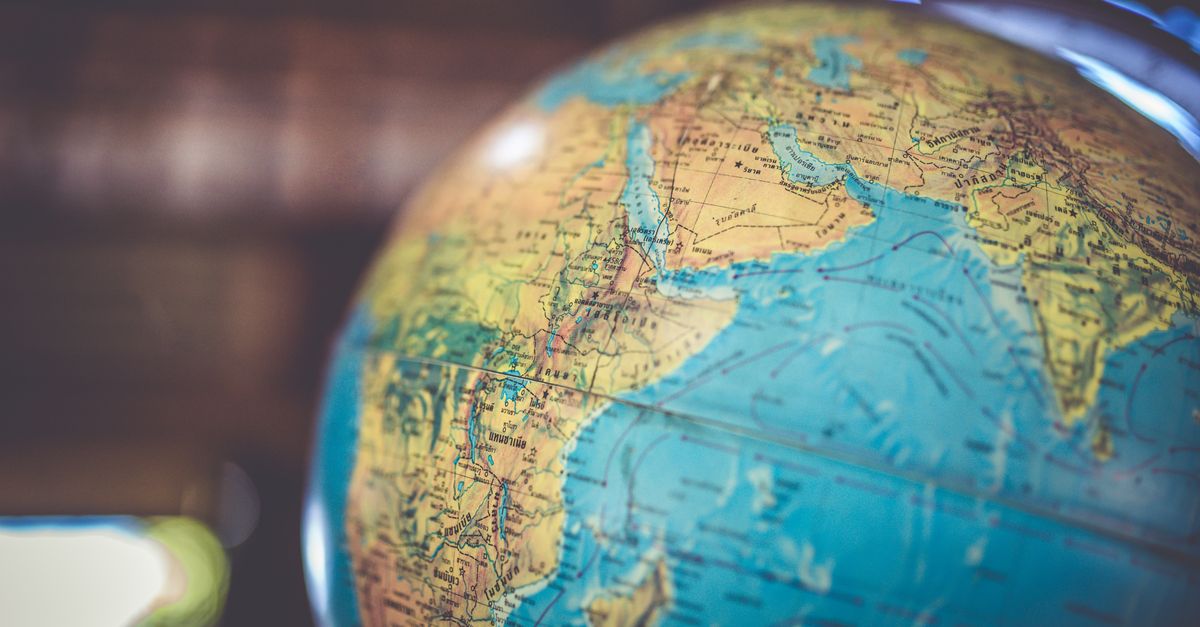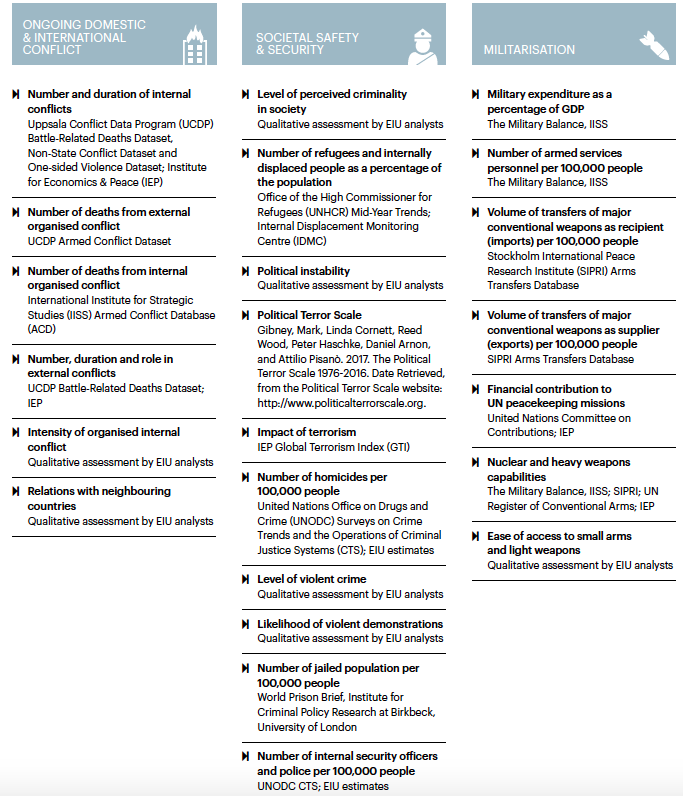Based on the analysis contained in the Global Peace Index, the United States could reasonably be described as being among the least peaceful countries in the world in 2019, having ranked 128th out of 163 countries and territories.
The Global Peace Index is not a straightforward measure of safety, and under the section on "Social Safety and Security," the U.S. performed considerably better than its overall ranking, placing 59th out of 163 countries and territories.
In September 2019, we received inquiries from readers about the accuracy of a widely-shared tweet claming that the United States had been ranked the "118th safest country in the world" in 2019, a decline of 53 places in just one year.
The claims originated with a September 3 tweet by @ResisterSiano, a left-leaning, anti-Trump Twitter account, which said: "The United States is the 118th safest country in the world. 118. Down from 65th last year. We fell 53 places in 1 year. The overwhelming majority of countries are now safer than the US. [I don't know] how else to say this. The United States is a dangerous shithole."
The United States is the 118th safest country in the world.
118.
Down from 65th last year.
We fell 53 places in 1 year.
The overwhelming majority of countries are now safer than the US.
Idk how else to say this.
The United States is a dangerous shithole.
— Sergio (@ResisterSiano) September 3, 2019
Those claims were further promulgated when a Facebook user posted a screenshot of the tweet, garnering thousands of shares within a week:
The claims constituted a somewhat confusing and misleading representation of the findings of the 2019 Global Peace Index (GPI), an annual report produced by the Institute for Economics and Peace, an Australia-based non-profit organization, in collaboration with the Economist Intelligence Unit, a research and analysis firm associated with the Economist magazine.
The originator of the tweet confirmed they had based their claims on the 2019 GPI in another tweet in which they wrote that "the United States ranked 118th in safety in 2019" and included a link to a summary of the report on the website World Population Review.
The Global Peace Index
The GPI tracks the overall "absence of violence or fear of violence" in more than 160 independent countries and territories around the world. The overall GPI score is based on 23 separate indicators which, taken together, describe the presence and impact of internal and external conflicts, the impacts of violent crime and instability (including homicide rates, terrorism, the proportion of refugees and internally displaced people within a given population, and so on), as well as the levels of militarization and the availability and prevalence of weapons within a country or territory, among several other factors.
The full list of 23 indicators can be viewed below, and a more detailed description of the methodology can be found in the 2019 GPI (starting on page 84):
The GPI is not simply a measure of "safety" within a country, and it cannot be claimed, in a straightforward or reliable way, that a country which ranks 100th, for example, in the GPI is therefore "the 100th safest country in the world."
It is probably more apt (though still imprecise) to describe the index as a rough approximation of each country or territory's overall peacefulness, a term which takes into account public safety and violent crime, but also factors such as militarization and the presence, impact, and intensity of national and international conflicts.
Notwithstanding these important distinctions, safety and security do form an important component of the GPI, and "Societal Safety and Security" is one of the index's three main strands, along with "Ongoing Domestic and International Conflict" and "Militarization."
"Societal Safety and Security" does include some indicators which a reader might typically associate with "safety," such as the level of violent crime, the impact of terrorism, and the homicide rate, but it also takes into account several factors which a reader would not typically associate with "safety," such as political instability and the ratio of police to population. Conversely, "ease of access to small arms and light weapons" -- a factor which many observers in the U.S., in particular, might associate with public safety -- is included in the "Militarization" strand, and not "Societal Safety and Security."
More broadly, the overall GPI score takes into account several other factors which a reader would not typically consider when making a straightforward assessment of the "safety" of a given country, such as: a country's financial contribution to UN peacekeeping missions; the prevalence of refugees and internally displaced persons within the population; military spending as a percentage of GDP, and others.
Bearing in mind the aforementioned nuances and complexities inherent in the GPI and its methodology, the following is a breakdown of the United States' rankings (both overall and for each of the three strands), from 2015 to 2019:
U.S. Rankings in Global Peace Index, 2015-2019
(Out of 163 countries/territories, unless otherwise stated.)
| Overall Rank | Ongoing Domestic and International Conflict | Societal Safety and Security | Militarization | |
| 2015 (162 countries/territories) | 94th | 118th | 49th | 158th |
| 2016 | 103rd | 102nd | 32nd | 159th |
| 2017 | 114th | 101st | 43rd | 159th |
| 2018 | 121st | 122nd | 47th | 160th |
| 2019 | 128th | 124th | 59th | 161st |
Even if we set aside for a moment the inherent nuances in the GPI and the indicators of which it consists, those rankings lay bare several factual inaccuracies contained within the tweet.
First, the U.S. did not rank 118th in the 2019 GPI, by any measure, and it's not clear what the basis was for citing that number. The United States' overall ranking was 128th, and when it came to "Societal Safety and Security" -- the strand which arguably represents "safety" most closely -- the U.S. ranked considerably better, at 59th out of 163 countries.
On "Societal Safety and Security," therefore, only around 36 percent of countries performed better than the United States, which somewhat undermines the claim that "the overwhelming majority of countries are now safer than the U.S."
Furthermore, no justification exists for the claim that the U.S. "fell 53 places in one year," although the U.S. did rank lower by every measure in 2019 than the year before, and 2018 represented a decline in rankings by every measure from the year before that.
The actual decline in U.S. rankings between 2018 and 2019 was: seven places in the overall rankings; two places under "Ongoing Domestic and International Conflict"; 12 places under "Societal Safety and Security," and one place under "Militarization."
Notwithstanding these factual inaccuracies, and the over-simplistic invocation of the concept of "safety," there is a justification for saying that based on the many and varied factors that go into the GPI, the United States was ranked the 128th most peaceful country in the world in 2019, an even lower ranking than 118th.
That is to say, the United States could reasonably be described as being in the bottom 23 percent of the world's nations when it comes to overall peacefulness (which takes into account public safety and violent crime, but also international conflict and militarization).
That ranking placed the U.S. below Central American nations such as Honduras (123rd), Nicaragua (120th), Guatemala (114th) and El Salvador (112th), as well as the African nations of Niger (126th), the Republic of the Congo (121st), and Kenya (120th), and historical rivals such as China (110th) and Cuba (91st). The U.S. ranked significantly below many of its European and NATO allies, such as the U.K. (joint 45th), Germany (22nd), and Canada (6th), but notably did outrank Russia, which was placed at 154th out of 163 countries and territories.
Despite a somewhat confusing and misleading representation of the GPI, the index's actual findings would no doubt be just as worrying to many Americans.


